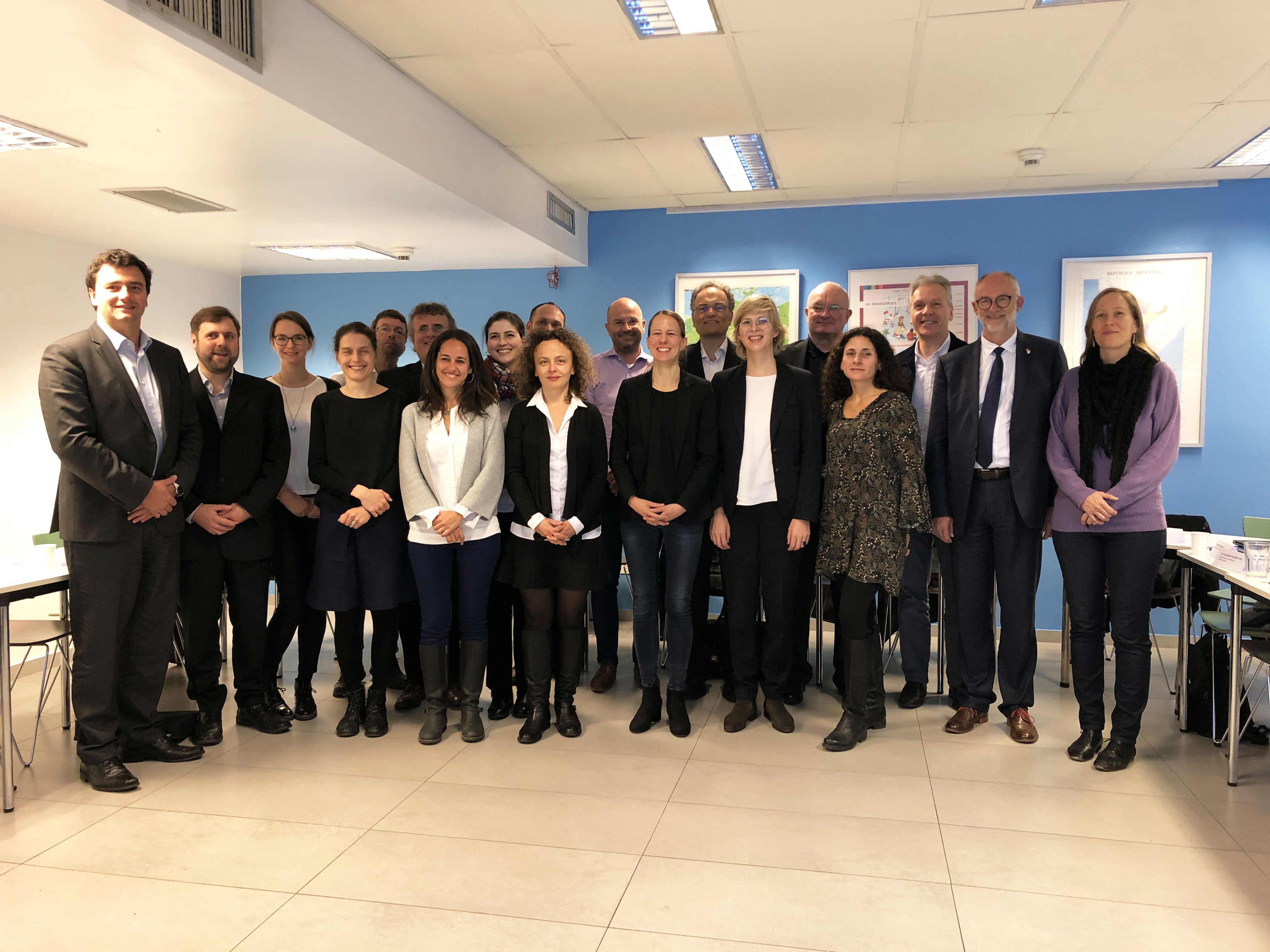DFG Office Latin America attends science and research networking meeting in Buenos Aires
(27.06.18) On 18 June, representatives from a number of German science and research organisations gathered in Buenos Aires to discuss projects currently underway in partnership with Argentina, touching on the challenges and future prospects. Each of the institutions introduced themselves and their work, before the some 25 attendees used the science and research networking meeting as a chance to talk about potential areas of collaboration and synergies for future joint activities. It was clear to see at the event just how interested the German organisations are in maintaining and developing their strong ties to science and research in Argentina.

Representatives of German science and research institutions at the networking meeting in Buenos Aires
© German Embassy Buenos Aires
Carl Moses from Germany Trade & Invest (GTAI) was invited along to provide an overview of the current political and economic situation in the country. Argentina is facing some economic turbulence right now, which is being exacerbated by the high inflation index and dollar exchange rate. The impacts of this are being felt all over. The science and technology sectors have suffered as a result of cuts, but the aid credit recently provided by the International Monetary Fund is expected to help improve the economic situation over the coming months. “It’s a bit like using a sat nav – politics relating to the economy in Argentina is all about constantly recalculating and finding a new route. The final destination never changes – it’s just necessary to find new ways of getting there, taking into account everything that’s changed and all the unexpected situations that have arisen,” says Moses.
According to Judith Lehmann, Head of the DAAD Information Centre in Buenos Aires, the crisis does not prevent a growing interest in bilateral research cooperations with Germany. “Here at the DFG, we have also noticed a steady increase in research cooperation ventures between Germany and Argentina during the past few years. This is down to the high level of education and research in Argentina as well as the programmes and calls we have set up together with our Argentinian partner organisations CONICET and MINCYT over recent years. The DFG has long-standing cooperation agreements with both organisations that have proven successful to date,” adds Kathrin Winkler, Head of the DFG Office Latin America in São Paulo. The agreement with the National Scientific and Technical Research Council (CONICET) has existed since 1987, whilst the one with the Ministry of Science, Technology and Productive Innovation (MINCYT) took effect in 2013.
During the networking meeting, the DFG also offered some insight into activities planned for the future. The third joint call for bilateral projects in various fields that is organised with CONICET and MINCYT, is set to be published during the second half of the year and there will be a Leibniz Lecture with geoscientist Prof. Dr. Gerhard Wörner in August. Further information will be released shortly.
The DFG is not alone – a number of other German research organisations are also active in Argentina, including the Max Planck Society, which has 5 of its 90 international partner groups based in Argentina. The German-Argentinian University Centre (CUAA-DAHZ) funds 18 binational degree courses (11 master’s programmes and 7 doctoral programmes), whilst the Helmholtz Association supports German and Argentinian doctoral researchers working on astroparticle physics at the National University of General San Martín (UNSAM) and the Karlsruhe Institute of Technology (KIT). The Technical University of Berlin (TUB) also joins forces with the University of Buenos Aires (UBA) to offer a master’s degree programme in urban planning and mobility. Another example of long-standing collaboration (since 1998) is provided by the Pierre Auger Observatory for research into cosmic rays, which is located at the foot of the Andes Mountains in Argentina. It has partnerships with 15 different countries, including Germany.
Alongside the work in science and research, the President of Argentina, Mauricio Macri, is keen to partner with Germany to tackle the issues of energy generation and storage, with a focus on water-based technology. A number of Argentinian ministries and the Fraunhofer Society’s Institute for Energy Economics and Energy System Technology (IEE) are involved in this too. 2019 will mark 50 years of collaboration in research and technology between Germany and Argentina. Various events are set to be lined up and the DAAD will also be celebrating its 20th anniversary in Buenos Aires.